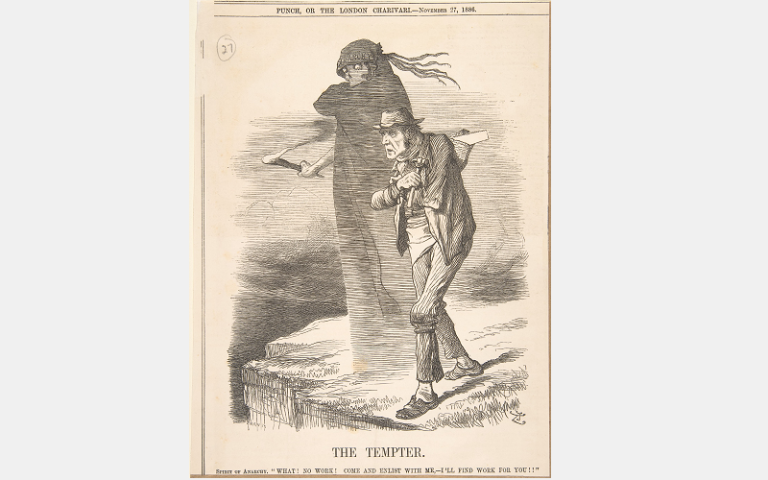Who is the Devil?
There's about 8 billion humans on planet Earth. No matter how cruel any of them is, none of them is Devil-level-evil.

12 September 2023
Given this fact, why are we even asking “Who is the Devil?” Presumably, it's for religious reasons. So it’s interesting to ask this question of academics at UCL, given that this was the first university in the UK established on a secular basis, and famously described as “that Godless institution in Gower Street”. We don't have a department of theology here, and never have. You’ll have to take your answer from a philosopher (and indeed a “freethinking philosopher”, to use a phrase from around the time UCL was founded).
Several religions mention the Devil, or devils, or something similar. Since there isn’t space to survey all the religious answers here, I’ll focus my answer on some very broadly Christian views.
That’s partly for personal reasons. As a child, I was terrified of the Devil. I thought he’d tempt me to do bad things; that I wouldn’t be able to resist; that I’d end up joining the side of darkness; that I’d be punished for all eternity. All scary stuff, for a child. Maybe, in writing this, I can give some answers to my past self.
I just mentioned a few characteristics associated with the Devil (the supreme tempter, punished for all tempter). If we’re going to ask about the Devil, we’ll need to pick out some of those characteristics specifically. So let’s start by considering:
— Is there a Devil, who will be punished for all eternity? —
This needs to be nipped in the bud. According to Thomas Aquinas, Heaven wouldn’t really be paradise, unless the blessed (in Heaven) see the eternal torments of the damned [Summa Theologiae, Question 94]. But I really wouldn’t take Aquinas’s word on this.
We’re meant to have been told that “God is love” (1 John 4:8). Does it sound like love, to sentence someone to an eternity of torment? Or to insist (as Aquinas did) that perfect bliss requires looking—with pitiless, clear eyes—upon this absolute suffering? No: neither like love; nor like bliss.
Well, perhaps the “God is love” part is wrong? But then, why worship God? Fear of punishment is no reason to worship; at best, it’s a reason to cower, and to pretend to worship. If God is really to be worthy of worship, we need to stick with “God is love”. And that means rejecting the whole idea of eternal punishment.
Ok, so let’s get back to the Devil. Even if he isn’t going to be punished for all eternity for his crimes:
— Is there a Devil, whose lies are the source of our temptation? —
I doubt it. Bluntly: what's the point of positing such a Devil? Humans don’t need to be led astray by some supernatural person. As soon as we are capable of thinking about how our actions will affect others and ourselves, we are perfectly capable of leading ourselves astray.
(In the TV show Lucifer, the main character, Lucifer Morningstar, is frequently frustrated by how often humans blame him for leading them astray. I sympathise. But while we’re on the topic of guidance, I’d add that we also don’t need to be led to righteousness by some supernatural person. Once we can weigh up our actions, we're capable of steering ourselves aright.)
Well, let’s try another question. There’s a theological view, that all good is done in God’s name (whether God is invoked explicitly or not). There’s a flip-side of that view, that all evil is done in the Devil’s name. So we might ask:
— Is there a Devil, in whose name all evil is done? —
My answer here is a bit like my answer to the previous question: I don’t see the point of positing such a Devil.
But in fact, I want to say more than this. It’s not just that it’s pointless to posit such a Devil; it’s a deep (ethical) mistake, to think that our actions have to “go on a detour”, via God or the Devil, in order for them to count as good or bad. They are good or bad, just because of their effects on us, here, on Earth. The existence (and strength) of our ethical bonds does not depend upon anything other than us; for we are valuable in ourselves and are immediately related to each other.
This, indeed, is part of what it would be, for humans to be made in “God’s image”. So I don’t think this last claim is much affected by whether you believe in God or not. I think atheists, monotheists, henotheists, polytheists, etc, should all agree on this point. As William James put it, in “The Moral Philosopher and the Moral Life":
Whether a God exist, or whether no God exist, in yon blue heaven above us bent, we form at any rate an ethical republic here below. And the first reflection which this leads to is that ethics have as genuine and real a foothold in a universe where the highest consciousness is human as in a universe where there is a God as well.
But now I’m out of questions to ask. I’ve found no role for a devil to play. So I have to say: No one is the Devil.
 Close
Close


